
Let’s get this squared away right now before some of you think I have a problem with podcasting.
Our company has worked hard to establish our cred in the space. Seth Resler has created some strong content over these past several years, and we’ve worked hard to support Podcast Movement as it has grown over the years. He and I will be enthusiastically returning to this amazing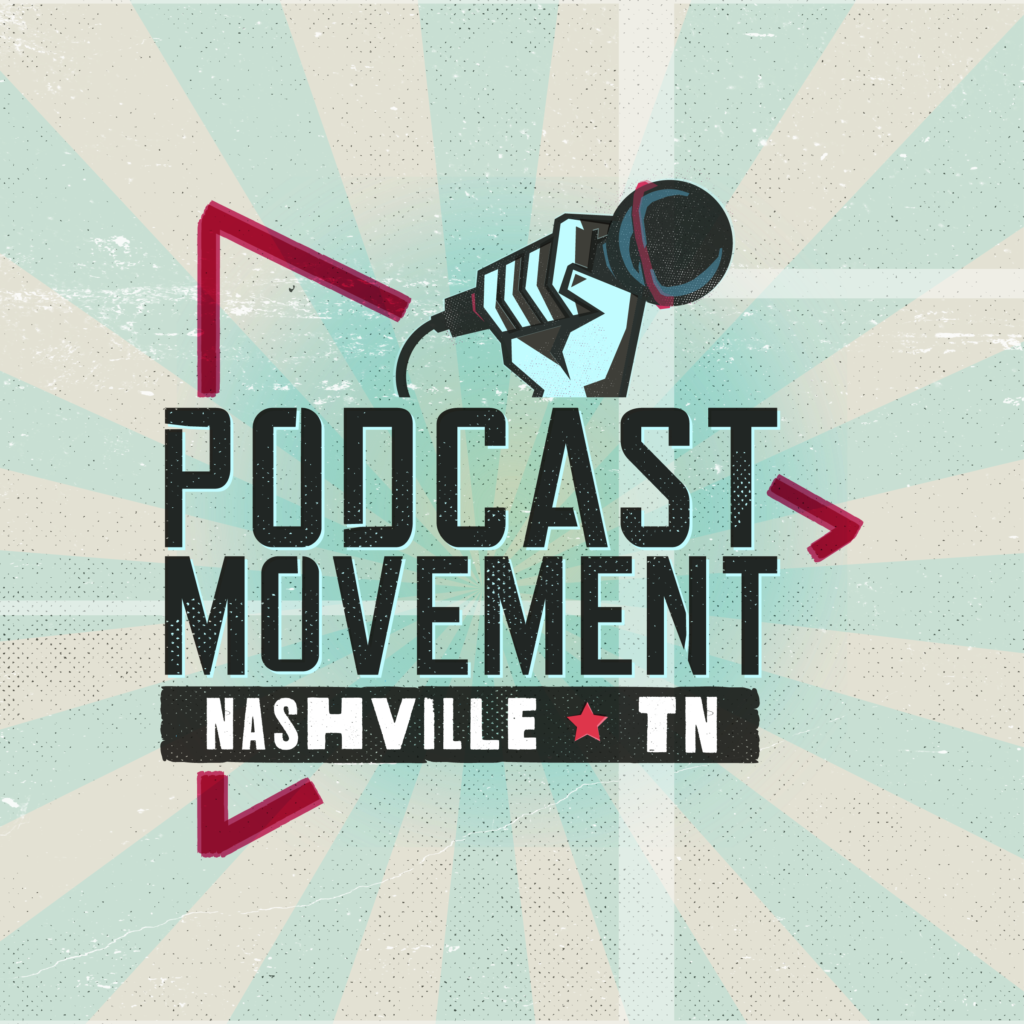 conference this summer in Nashville.
conference this summer in Nashville.
The confluence of this event located in Music City is attractive. It should draw a lot of folks wondering how to integrate their musicianship into what is still primarily a spoken word medium.
Podcasting is rightfully at the epicenter of audio’s reawakening. (Here in Radioland, it never went away.) As radio players like NPR and iHeartMedia have embraced, podcasting appeals to a younger and more diverse demographic – a fact that should be of interest to all broadcasters.
Looking around the radio landscape, there’s a lot of exuberance for podcasting. The radio industry’s biggest companies have doubled down – even tripled down – on the still-emerging medium. Based on the buzz, the revenue, and the cache, podcasting has been at the forefront of the so-called audio renaissance.
And podcasting has attracted some of the biggest celebrities on the planet. When Barack Obama sits down with Bruce Springsteen to shoot the breeze about their lives and times, we should take note they didn’t come together to launch a syndicated radio show.
But is much of podcasting’s mojo misplaced or even irrational? What are the sand traps that are conveniently ignored because they might contradict the euphoria of the moment?
As someone who entered the business breaking down Arbitron rating books (translation: my job was to dig up the “sunshine” in the numbers, while downplaying, ignoring and overlooking the sad truths in these reports), I keep poring over the data generated by our 42,200+ core radio Techsurvey listeners again this year to discover what’s really going on with podcasts.
And I learn that many regular radio users, in fact, love podcasts. Overall consumption hit an all-time Techsurvey record this year. Nearly three in ten (29%) now listen to podcasts weekly or more often. That’s consistent with research we see around the country. And podcasts are especially appealing to those who are moving away from radio – those pesky Gen Zs and their older siblings and parents, Millennials.
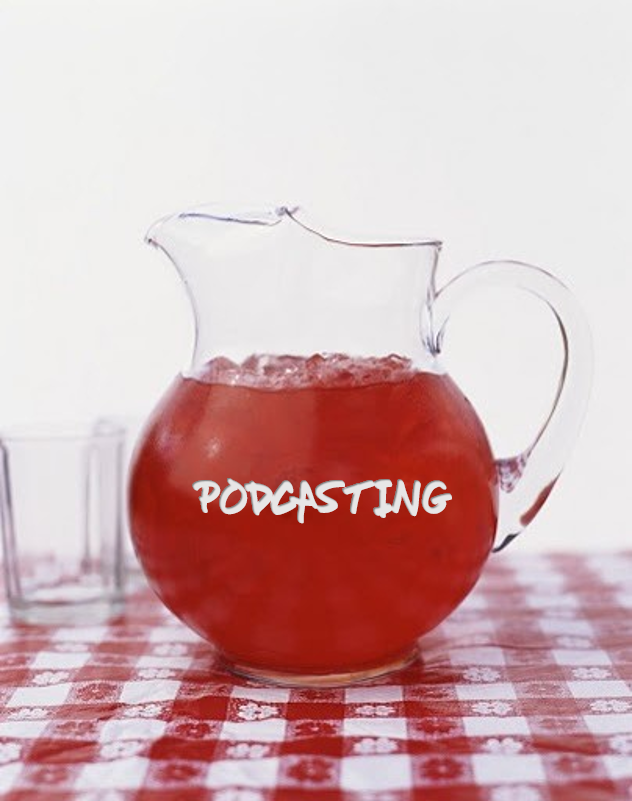 So why am I not chugging the podcasting Kool-Aid along with everyone else?
So why am I not chugging the podcasting Kool-Aid along with everyone else?
Podcasting has issues that its biggest supporters would be wise to confront. Because by doing so, the space stands an even better chance of reaching its potential, both as content that matters and as media that pays its producers, talent, and parent companies handsomely.
Here are my three inconvenient truths about podcasts in 2021 based on the data I continue to see:
1. Podcasting has yet to become a mass medium – More fans of radio now listen to podcasts every week than ever before. Some even listen to them every day. But it doesn’t take a deep dive at the pie chart below to see the biggest slice is what we call “podcast nevers” – folks who have failed to make podcasts part of their media menus.
Many have never listened to a podcast – ever. They don’t know what they are, where to find them, or how to access them. No one’s made the case there’s something there, in spite of the “long tail” of podcast content that covers every conceivable genre, hobby, pastime, cause, and fetish.
Between those folks, and the one-fifth who listen to podcasts less than monthly, we’re looking at six in ten core radio listeners who aren’t especially involved with the hottest audio product out there right now.
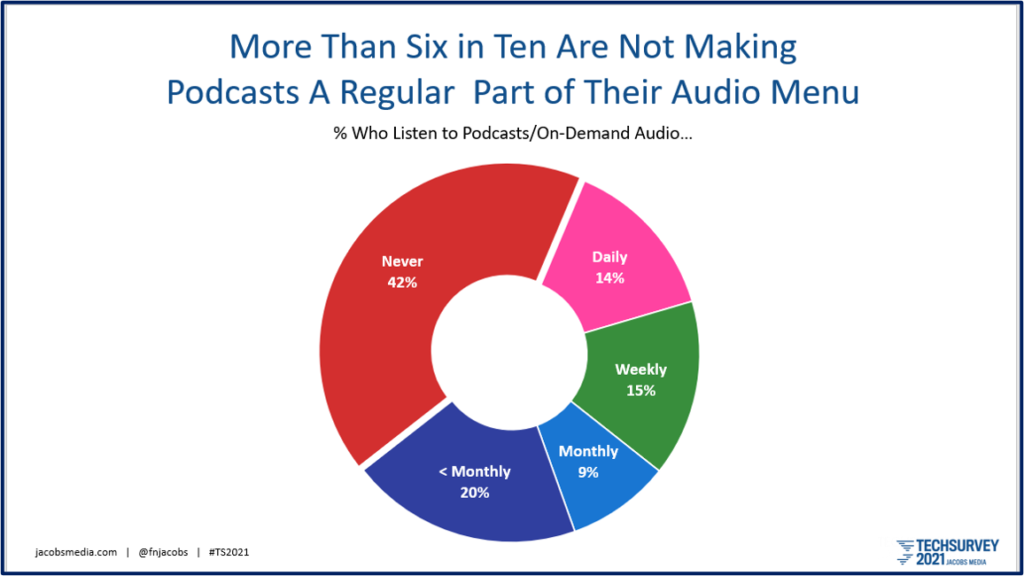
Why is that? After more than 15 years as a medium, why has growth been this modest, in spite of the hype, the ballyhoo, and the bombast? Theories abound. Our research has shown there’s no smoking gun. Some folks don’t understand the technology, others don’t know how to discover podcasts or how to listen to them, and some just don’t love listening to spoken word content.
But perhaps at the root of the issue is that lack of mainstream buzz – when you hear from friends and family you should see that movie, try that restaurant, and test drive that car. It’s why iPhones broke through years ago, and while the Apple Watch is still bubbling under. As Tim Cook recently explained, “I still think we’re in the early innings on the Watch. The number of people that are new to the Watch is almost three out of four, and so this is a long way from being a mature market.”
And so it is with podcasting, a medium that for a large plurality of people has yet to be discovered.
2. Podcast listeners dislike commercials, too – I realize this “inconvenient truth” runs counter to everything you read and hear about podcasting. The conventional wisdom is that podcast fans appreciate fewer ads, while embracing host-read ads (better known in radio as “live reads”).
But the truth is that while commercials read by a trusted podcast producer are more popular than a produced commercial for Kars-4-Kids (the same is true, by the way, in radio), most people skip them while listening to their favorite podcasts. And the ability to zip through ads – yes, even those “sincere” ones read by hosts are a turn-off.
Here’s the Techsurvey data among regular podcast listeners that confirms it – a majority skip the ads all or most of the time:
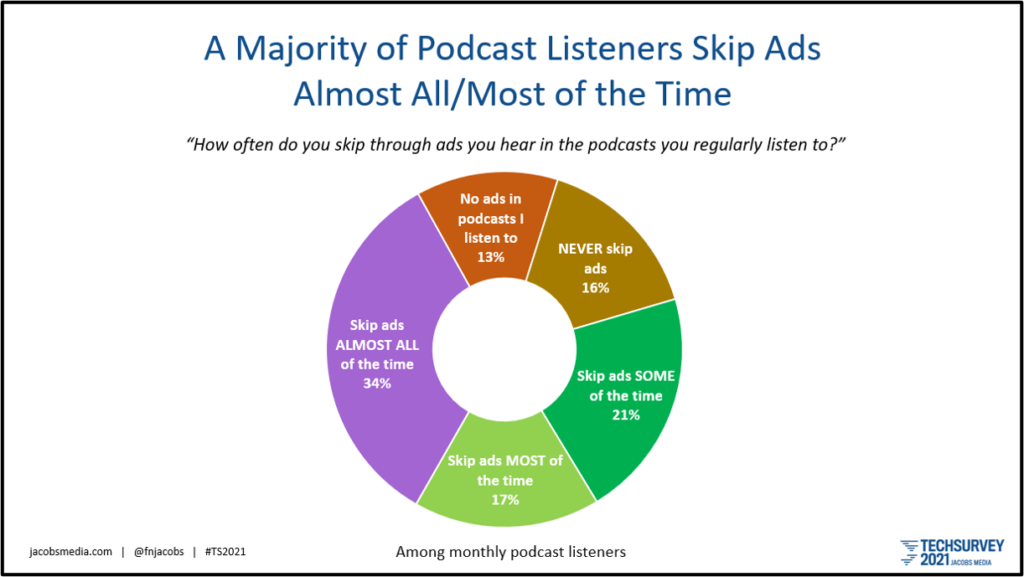
Commercials suck – whether they’re read by Marc Maron or Elvis Duran.
3. Podcast listening can be erosive to radio listening – Or TSP (time-spent podcasting = < TSL), for those of you who love radio acronyms and formulas. The “myth” is that podcasting has expanded our time with audio. And to some extent that’s true. Most research shows consumers are spending more of their minutes and hours listening to audio – music, podcasts, Clubhouse, radio, etc.
But even with more quarter-hours being devoted to audio consumption, there are only so many hours – or quarter-hours – in a day. When podcast listeners become P1s to the medium, something’s got to give.
Radio.
I know that other research makes the case that audio co-existence is a real thing, and that podcast listening is complementary to radio listening. But we’ve been asking the question in Techsurvey – among core radio listeners who are also weekly consumers of podcasts;
“As a result of listening to podcasts, how has it impacted your ‘real time’ AM/FM radio listening?”
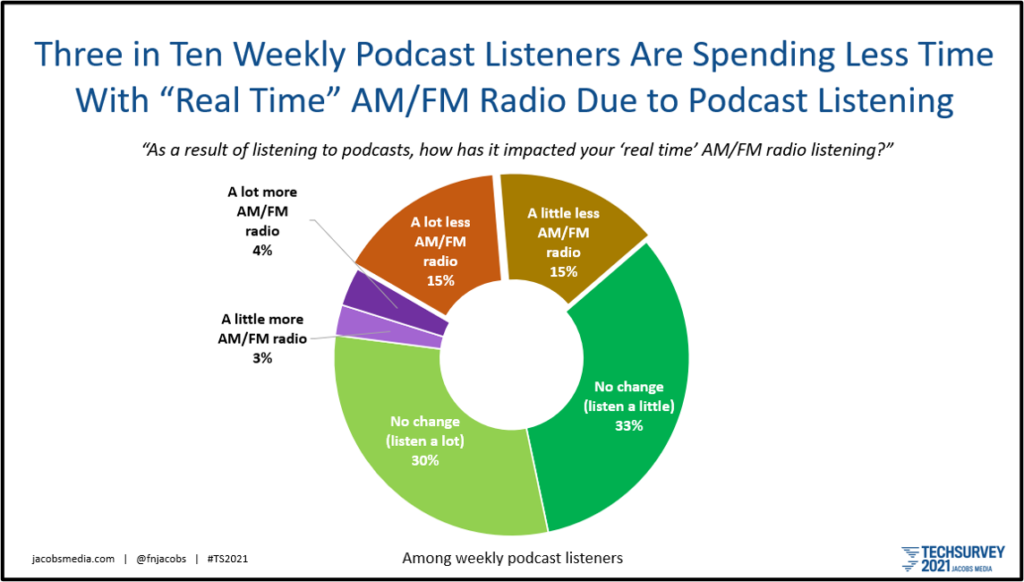
And the data shows that three in ten have cut back their radio listening since moving into podcasts – in some cases, a lot of their broadcast time. In fairness, 7% say they’ve started listening to more radio since becoming a regular podcast user.
But the net negative is still a big one – 23% of these radio fans that are spending less time with the medium. And as more people discover podcasts (see inconvenient truth #1), those numbers will grow.
None of this is to say that broadcasters shouldn’t become podcasters. The money, the attention, and the zeitgeist are all moving to podcasts. We should note that Will Farrell and Demi Lovato are not doing radio shows.
But when radio continues to heavily promote its podcast portfolio on its battalions of radio stations, we can easily see which way the wind is blowing. There is a price to be paid for “driving ears” to podcasting – and broadcasters need to understand and accept that inconvenient truth..
Meantime, I’m please to tell you I’m the featured guest on Matt Cundill’s great Sound Off Podcast this week. Access it here.
And we’ll be discussing the in’s and out of podcasting later this week in our free Techsurvey 2021 webinar. Info here.
- Media And Technology In 2025: Believe It Or Not! - April 18, 2025
- In Radio, You Just Never Know - April 17, 2025
- The Secret To Making A Great Podcast (And Great Radio) - April 16, 2025




Wow, great post. We as broadcasters have forgotten what got got us here. Good ol’ entertaining radio. I don’t think that NTR, websites, podcasts, national contests hurt radio, unless that is where you are spending the bulk of your time.
Can we please get back to making radio great again. You remember when you couldn’t turn the radio off because of the great music and hosts you felt close to? I know, I sound like a dinosaur, but let’s do what we do best….ENTERTAINMENT!
Scott, I’m on board. Thanks for chiming in on this.